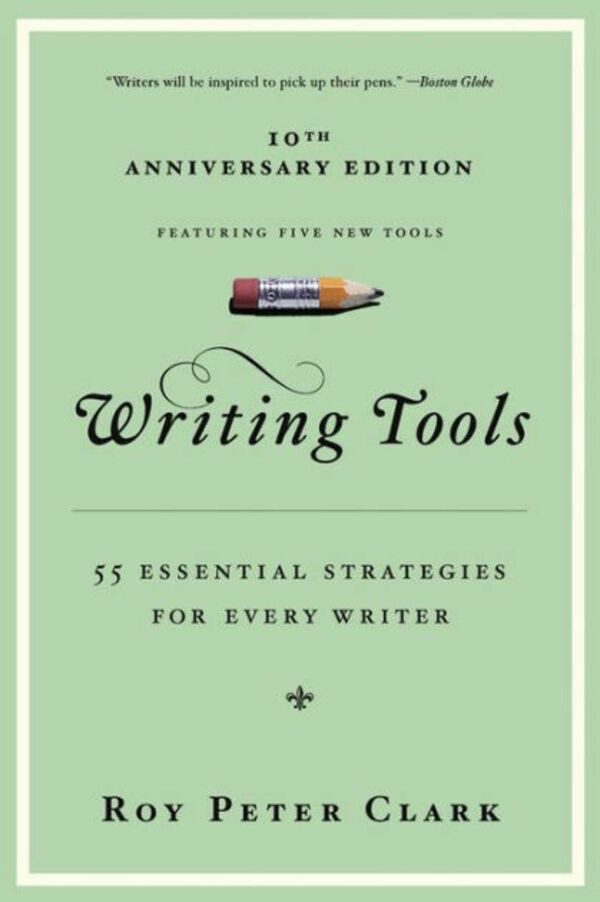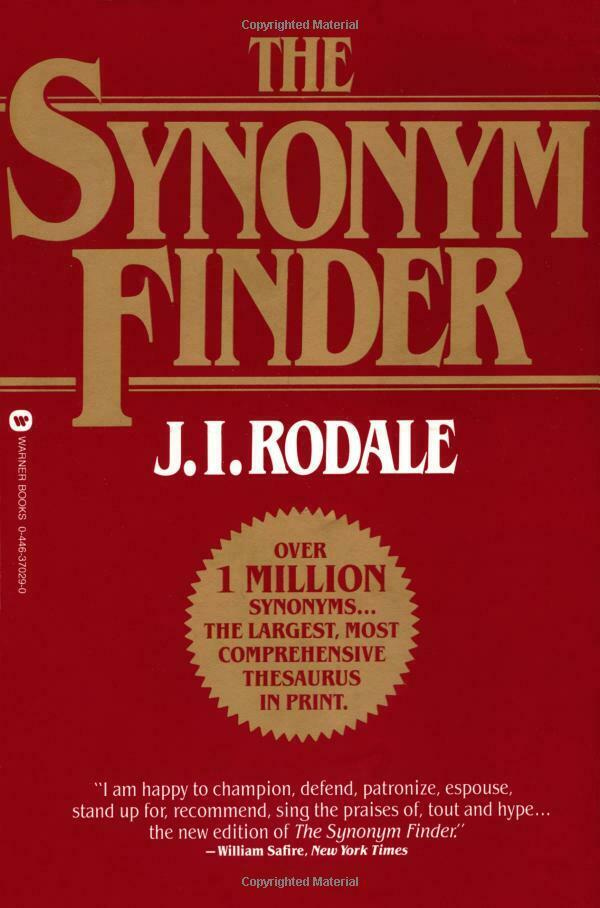The Best Factual Podcasts

Top 50 most popular non-fiction podcasts in 2015
Podcasts are on a roll. Diversity and quality keep expanding. New ones pop up every day. But there are precious few comprehensive guides to locating the best podcasts out of the tens of thousands available. It is extremely difficult to find impartial, independently verified measures of audience size for podcasts. They either don’t exist or don’t circulate. Different proxies for audience size have no consensus. And, of course, audience size is not everything.
We made a list of the best factual podcasts by ranking the most popular factual podcasts from the results of an unscientific survey we posted online several months ago. We asked readers of this Cool Tools blog and our social followers to take our survey and rate some suggested podcasts — and to add ones we did not know about. More than 1,600 people filled out the survey, and by the end we had a list of 775 suggested titles. We combined the number of times a podcast was checked together with its average rating to come up with a total score. We then sorted the final list of podcast titles by rank. (The full data dump is here.) We wrote descriptions for the top 50, shown below. (The rankings in this list are biased to our original suggestion list; we’d do the survey differently if we did it again next year.)
There are two broad types of factual podcasts; unscripted and scripted. Unscripted shows are usually interviews or discussions that play out as recorded. The producers don’t know, nor have much control, over where the show goes. Scripted shows, on the other hand, will carefully edit interviews after the fact, mixing them with narration, inter-splicing them with other interviews, maybe adding a soundtrack or ambient sounds. They craft the raw factual materials into a highly produced show in the way a reporter might craft a magazine article, rather than just run a Q&A. Scripted shows, on average, take much more energy, time, staff (and money) to make than unscripted shows (with some exceptions). It is no surprise that the highest ranked podcasts are scripted.
Our list follows this format to give you some clue of what you’ll get if you subscribe via the link provided: Popularity rank and title. Scripted or unscripted. Name of host, typical show length, and average episode frequency. This last one is a little squishy because broadcast frequency is often irregular, or a show runs for an ill-defined “season” or sometimes it appears “whenever.” Last in each item is a description written by us about why it might be worth your while.
Disclosure: The two of us have appeared as a guest on many of the unscripted shows listed here. We also run two of the top 50 podcasts as indicated by our survey. And we are friends with principals of some of the other shows. This fact may have distorted readers’ opinion. Importantly we are regular listeners of about 3/4 of the top 50 and we speak from personal experience when writing their descriptions. However, we don’t have direct experience with about 1/4 of the podcasts mentioned here; those descriptions are compiled from comments made by survey takers, from the shows’ producers, and reviews online. Maybe by next year we’ll have listened to these recommended ones and can say something first-hand about them as well.
If we have overlooked your favorite factual podcast, tell us about it in the comments.
— Kevin Kelly and Mark Frauenfelder
1.

This American Life
Scripted, Ira Glass,
1 hr, Weekly
Mostly true short stories, presented in an audio documentary style. Each segment is superbly crafted with a satisfying emotional arc. A common subtext of a typical story is transformation. Four stories form a rough theme each week, but subjects range widely and unexpectedly. This podcast is consistently top notch and creative, and after decades on the air it is still the gold standard for scripted shows. Their archive is a national treasure that will fill your days.
2.

Radiolab
Scripted, Jad Abumrad and Robert Krulwich,
30 min-1 hr, About 2 per month
Two hosts investigate big scientific questions in an experimental audio style — the “lab” part. Such as: what is time? What is space? Shows are often structured as a debate between the hosts, as they produce sonic evidence (and an original soundtrack for each episode) to keep you changing your mind. Just the way science is suppose to work. There’s a deliberate informality that makes the process of producing the show transparent, all of which keeps it innovative and surprising. Each show also tries to redefine what a podcast can be by mutating the current form. Surprise is certain.
3.

Serial
Scripted, Sarah Koenig,
30 min-1 hr, About 10 a year
The first season of this amazing long-from audio saga (about 10 hours) follows an investigative journalist who dives deep into an old high school murder case. No detail is left unexamined. The thrill is the complete immersion into someone else’s world and the mystery of what happens next. Upcoming seasons promise to apply the same full-court investigations to other subjects.
4.

99% Invisible
Scripted, Roman Mars,
15-30 min, Weekly
Take the boring background things that fill 99% of our lives, all the stuff we never think about — airport carpeting, hold music on telephones, railway tunnels — and really look at them closely. Where did they come from, who made them, and what were they trying to do? Each of these “invisible” objects or systems holds a fabulous story about the people behind them, and their accounts can delivery remarkable insight about how this built world actually works. This is probably the only podcast dedicated to infrastructure, yet it’s the least boring podcast ever.
5.
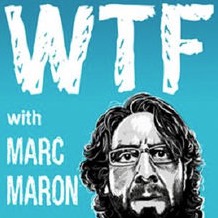
WTF with Marc Maron
Unscripted, Marc Maron,
60–120 min, Twice-weekly
Standup comedian Marc Maron invites the very famous (President Obama, Mick Jagger) and marginally-famous (cartoonist Drew Friedman, drummer and psychologist Steve Dansiger) into his cat-filled garage where he has a long conversation with them. Maron’s gift of self-deprecation, broad knowledge of popular culture, and appealing nebbishness opens his guests up, allowing them to feel comfortable enough to reveal things they wouldn’t share on late night talk shows.
6.
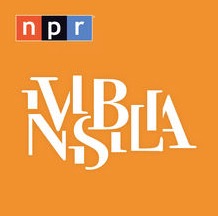
Invisibilia
Scripted, Lulu Miller and Alix Spiegel,
1 hr, 6-episode Pilot Run
All the things we thought we understood about our inner selves are probably wrong. This show explores new notions about our interior landscape. Each show is a tightly-crafted capsule of audio perfection. While they deal in abstract ideas, the stories are about real people, real lives.
7.

The Memory Palace
Scripted, Nate DiMeo,
5-15 min, Monthly
DiMeo tells true stories about forgotten things that happened in history, with musical accompaniment. Like a modern-day Paul Harvey’s “The Rest of the Story.”
8.

Reply All
Scripted, PJ Vogt and Alex Goldman,
30 min, Weekly
A sort of a This American Life focused on the internet and all its fast moving frontiers. Rather than report on the latest news, it quickly delves into the lives of the people who are out of the news. Not CEOs or digital celebrities, but the people who work at the support desk, or who are the last to sign up for something, or who are hacking the systems, or who are toiling in online obscurity. This podcast airs the humanity of the internet, good and bad.
9.
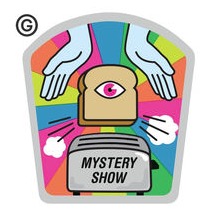
Mystery Show
Scripted, Starlee Kine,
30 min-1 hr, About 2 per month
A trivial mystery that is important to only one person and that could only be solved by a lot of detective work becomes an excuse for host Starlee Kine to uncover the stories of people unlike you. The only point in answering these unimportant questions (one per episode) is to encounter parts of the universe that your own rational and efficient lives would have no hope of intersecting. On this show the journey to the answer is far more entertaining than the answer, and the answer is always far more interesting than you could have imagined.
10.
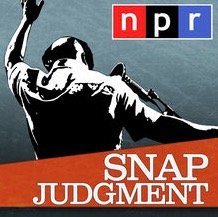
Snap Judgment
Scripted, Glynn Washington,
1 hr, Weekly
Like This American Life, Snap Judgment has 3-5 stories exploring a single theme in each highly-produced episode. The Atlantic calls it a “fast-paced, music-heavy, ethnically variegated take on the public-radio story hour.”
11.

StartUp
Scripted, Alex Blumberg and Lisa Chow,
30 min, About 2 per month
Frontiers are swathed in myths and misperceptions. This podcast illuminates the current fashionable frontier of startups, and it hopes to rid this territory of its riddles. The crew follows a few startups as they start up, tracking the novice founders in cringe-worthy closeness as they take each step forward and two steps backward. The company producing this podcast is itself one of the startups they track, making it very meta, but because they provide access to the innermost dynamics of launching a real company, this mirroring makes the reports riveting in their clarity. Overall they capture a lot of drama, which makes for great listening. It’s also indispensable if you have any romantic ideas of doing a start up.
12.

You Are Not So Smart
Scripted, David McRaney,
30-90 min, About 2 per month
David McRaney explores a different type cognitive bias or quirk (e.g., procrastination, learned helplessness, confirmation bias) in each episode through a combination of examples in the news, excerpts from movies and books, and interviews with psychology researchers.
13.

Song Exploder
Unscripted, Hrishikesh Hirway,
15 min, About 3 per month
In each episode, one popular song is dissected. The artist/composer steps through the song bit by bit explaining what they were thinking as they wrote it. Often they will play alternative sounds they tried that didn’t work. The artist will play and annotate the separate tracks, commenting on the logic and methods to create each track. The anatomy of the song is revealed in its pieces. Then the final song is played in full. It’s a mini audio version of a “making of” that works perfectly for one song.
14.
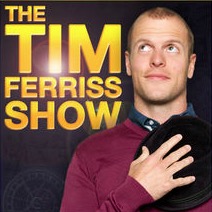
The Tim Ferriss Show
Unscripted, Tim Ferriss,
30-160 min, Twice-weekly
The distinctive superpower of Tim Ferriss is his ability to learn how to learn. He takes the skills you wish you knew — how to invest, how to grow physically strong, how to learn a language — and shows you how to methodically acquire that skill. To help that goal along, in this podcast he interrogates “world class experts” in a wide range of skills, to shake out their tricks and methods. These aren’t lazy shoot-the-bull interviews; rather Tim is zeroing in and asking for the very specifics you would if you were present: how exactly do you do this? Tell me step by step. The resulting “tutorial interviews” are unique in the podcast world.
15.
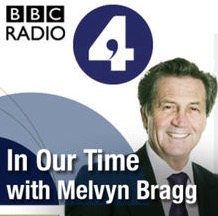
In Our Times
Unscripted, Melvyn Bragg,
45 min, Weekly
Each week three British professors who are experts in an esoteric field are led by the host to unpack their obscure passion and make it as plain as possible. The more esoteric the subject the better the show. Subjects like: The Siege of Constantinople. Gravity Waves. Occam’s Razor. Icelandic Sagas. Chivalry. The Talmud. Turns out that by narrowing the focus you can get to the bottom of things, and at the bottom almost anything is fascinating. Better than a bland Wikipedia entry, this podcast host defies the stereotype of a English don, at least one of the professors each week is is female.
16.
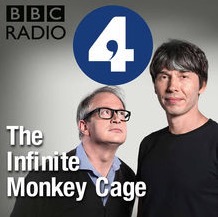
The Infinite Monkey Cage
Unscripted, Brian Cox and Robin Ince,
30-45 min, Weekly
“Has the loose format of a lighthearted round table, with topics like parallel universes, neurology and probability and chance. Each episode features practicing scientists and curious outsiders, often comedians with some science background.” – New York Times
17.
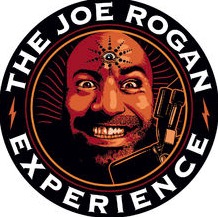
The Joe Rogan Experience
Unscripted, Joe Rogan, 2-3 hr,
10-14 episodes per month
Comedian Joe Rogan runs long conversations with other comedians and mini-celebrities that go on for several hours. In many respects the show resembles core talk radio without FCC oversight. Rogan will talk about anything, say anything, no topic is off limits. You get a lot of Joe. The show works if you like his sense of humor and exploratory instincts.
18.

Still Untitled: The Adam Savage Project
Unscripted, Adam Savage, Norman Chan and Will Smith,
30 min, Weekly
Experiential nerdiness. Mythbuster co-host and two buddies discuss making things, blowing things up, hollywood special effects, tools, props, science fiction and other nerdy subjects. Savage is encyclopedic in his experiences, and is continually trying new things. In his podcast he regales tales from his newest exploits (flying in a fighter jet, riding in a submarine, shooting a bazooka, etc.) and also offers practical advice he’s gained, for instance how to drive fast, or use a chainsaw.
19.

Love + Radio
Scripted, Nick van der Kolk,
30 min, About 2 per month
Unconventional true life stories with an edge. The stories are often more ambiguous and open-ended and racier than say the typical This American Life story, and may earn an “Explicit” tag. At the heart of the show is a fascination with complicated relationships and complex characters.
20.

Cool Tools Show
Unscripted. Mark and Kevin,
30 minutes, Weekly
We interview one guest per episode who raves about four tools they love. We let them gush about each tool, while we try to hone in on why listeners might want to use it. Show notes at the end make it easy to track the tools down later.
21.
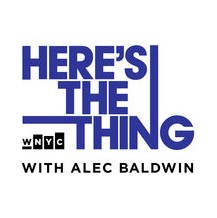
Here’s the Thing with Alec Baldwin
Unscripted, Alec Baldwin,
30 min-1 hr, Bi-Weekly
Actor Alec Baldwin is an unexpectedly brilliant interviewer. No neutral host he. Baldwin wields his own large personality as a lever to uncover genuine insights from guests who otherwise are polished and guarded. He gets people to say things they have not said before.
22.
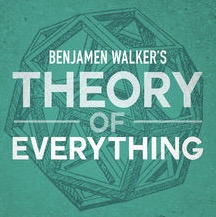
Benjamen Walker’s Theory of Everything
Scripted, Benjamen Walker,
30 min, Weekly
Like Paul Krassner’s Realist newsletter, Benjamen Walker reports on stories that are sometimes true, and sometimes fictional as a way to get to the heart of the theme of that week’s episode. Walker’s trembling voice and choice of music have a hypnotic effect.
23.
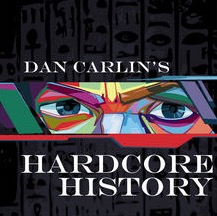
Dan Carlin’s Hardcore History
Scripted, Dan Carlin,
90 min-4 hr, About 4 per year
“Dan Carlin takes his ‘Martian,’ outside-the-box way of thinking and applies it to the past. Was Alexander the Great as bad a person as Adolf Hitler? What would Apaches with modern weapons be like? Will our modern civilization ever fall like civilizations from past eras? This is a difficult-to-classify show that has a rather sharp edge. It’s not for everyone. But the innovative style and approach has made ‘Dan Carlin’s Hardcore History’ a New Media hit.” – iTunes
24.

Fresh Air
Unscripted, Terry Gross,
45 min, Weekly
Easily the best interviewer in America, Terry Gross has an uncanny ability to ask the right questions and to listen at the right moment in order to get people to be genuine and authentic and tell you something you didn’t know.
25.

Freakonomics Radio
Scripted, Stephen J. Dubner,
30 min-1 hr, Weekly
“Inspired by the books of the same name, Freakonomics Radio is hosted by Stephen Dubner, with co-author Steve Levitt. An award-winning podcast exploring “the hidden side of everything”. From the economy, headline news to pop culture.” – Stitcher
26.

Planet Money
Scripted, Adam Davidson, David Kestenbaum and others,
15 min, Twice-weekly
“Helping you make sense of our rapidly changing global economy. NPR’s Planet Money highlights high rollers, brainy economists and financial experts to keep you up to date on the fiscal world.” – Stitcher
27.

The Truth
Scripted, Jonathan Mitchell,
15-30 min, Every two weeks
“Movies for your ears. Short stories that are sometimes dark, sometimes funny, and always intriguing. Every story is different, but they all take you to unexpected places using only sound. If you’re new, some good starting places are: Silvia’s Blood, That’s Democracy, Moon Graffiti, Tape Delay, or whatever’s most recent. Listening with headphones is encouraged.” – iTunes
28.
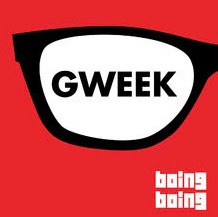
Gweek
Unscripted, Mark Frauenfelder,
15-60 min, weekly
Currently on hiatus this year, Gweek is a long-running podcast that featured Mark Frauenfelder, together with a regular guest, interviewing artists and authors who create games, comics, science fiction, toys, apps, tools, and other lighthearted geeky stuff. Mark, the co-founder of Boing Boing, and editor of Cool Tools, sees it as his job to discover new and nifty things.
29.

New Yorker: Out Loud
Unscripted, Amelia Lester,
15-30 min, Weekly
Each week one factual article from the magazine is given an in-depth treatment. The article’s writer will be interviewed by the whip-smart editors at the New Yorker. In the process the discussion will summarize the best parts of the piece and provide an inside look at its origins. This can be as good as or even better than reading the article.
30.

Design Matters With Debbie Millman
Unscripted, Debbie Millman,
30 min, Weekly
“A podcast about design and the broader world of creative culture through wide-ranging conversations with designers, writers, artists, curators, musicians, and other luminaries of contemporary thought.” – Design Matters
31.
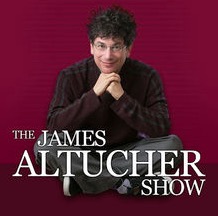
The James Altucher Show
Unscripted, James Altucher,
30-90 min, Twice-weekly
A really interesting person interviews other really interesting people.
32.
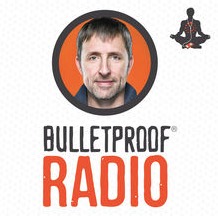
Bulletproof Radio
Unscripted, Dave Asprey,
1 hr, Twice-weekly
A far-out, self-styled bio-hacker who claims to have cured his obesity and Asperger’s by eating yak meat, buttered coffee, and a high-calorie, high-fat diet invites other far-out people from the world of health, diet, and psychology to share their ideas for optimal living.
33.
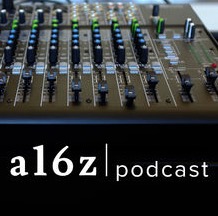
a16z
Unscripted, Chris Dixon and others,
15-30 min, 10 per month
Some of the smartest reporting in tech today does not come from magazines but from the offices of investors. They view from a high mega-level with a five-year horizon. This podcast comes from a16z, a VC firm that also produces steady blog posts. Here they interview a range of agents, such as CEOs, analysts, founders, journalists, and other investors. The topics are current trends in the high tech world.
34.

The Ihnatko Almanac
Unscripted, Andy Ihnatko and Dan Benjamin,
60-90 min, Weekly
Tech journalist Andy Ihnatko delivers extemporaneous and knowledgeable soliloquies about comic books, movies, technology, photography, and dozens of other topics. Like a very nerdy Roger Ebert. Co-host Dan Benjamin hardly gets a word in, but he’s there just to wind up Ihnatko and let him go.
35.

Latest in Paleo
Scripted, Angelo Coppola,
60-120 min, Weekly
Angelo Coppola takes a look at the latest news in health and diet, and provides perspective from a paleo point of view. In recent years Coppola has veered from a high-fat, high-protein “classic” paleo diet and is now closer to a being vegan who supplements his diet with a small amount of high-quality protein.
36.

Little Atoms
Unscripted, Neil Denny,
60-90 min, Weekly
A UK-based show dwelling on ideas, science and culture. Neil Denny interviews scientists, thinkers, scholars and writers. Casual, but he often interviews interesting people not usually heard from.
37.

Science… sort of
Unscripted, Patrick Wheatley, Ryan Haupt and others,
60-90 min, About 2 per month
Sitting around beers, a bunch of working scientists chat about science. They often take a breaking science story in the news and will read and discuss the actual scientific paper behind the headlines. That’s a powerful way to learn science and journalism at once.
38.

Open Source with Christopher Lydon
Unscripted, Christopher Lydon,
30-60 min, Weekly
Lydon often roams the world talking to notable people in other cultures who are totally off the radar in America. It’s really one guy with passport and a microphone. He’s incredibly smart, well-read, interested, and eager to disrupt old tired notions. His nimble mind seeks out other nimble minds around the world and he broadcasts what he learns.
39.

Transom Podcast
Scripted, Jay Allison,
5 min-1 hr, 3-5 per year
Each episode is one highly crafted story, often in a slightly experimental format. There is no theme, other than a story well-told.
40.
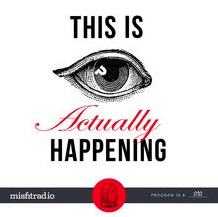
This is Actually Happening
Scripted, First-hand accounts,
30 min, About 2 per month
People who have undergone distressing experiences describe them. We do not hear the interviewer, only the person telling their story. The background music is a low-toned drone that adds to the sense of dread. In one episode a woman recounts the time that both of her husbands drowned on the same day (she is polyamorous). In another episode, a man describes seeing a ghost in a friend’s living room and the negative effect it has had on his life ever since. if you feel unlucky, this podcast will make you feel lucky, or at least not alone.
41.

Smart Drug Smarts
Scripted, Jesse Lawler,
30 min, Weekly
So-called smart drugs are chemicals believed by some people to improve mental performance. In this podcast, Jesse Lawler interviews doctors, pharmacists, and self-experimenters about the effects (or lack of effects) of different smart drugs, recreational drugs, electrical brain stimulation, research chemicals, psychedelics, and prescription drugs.
42.

The Moth
Scripted, First-hand accounts,
30-60 min, Weekly
Short stories narrated by ordinary people in their own voice in front of a live audience. The stories are true, first-person, and completely unexpected. They are selected from local storytelling events in about 30 cities around the world. Each story is a high quality, small journey.
43.
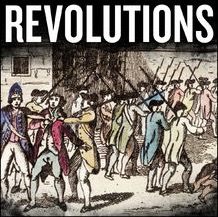
Revolutions
Scripted, Mike Duncan,
30 min, Weekly
Roman history geek Mike Duncan explores a dozen other historical revolutions which he explores in deep nerdy detail. He’ll devote 50 episodes to one revolution.
44.
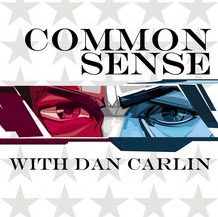
Common Sense with Dan Carlin
Unscripted, Dan Carlin,
45-120 min, About 2 per month
The popular maverick historian, Dan Carlin, takes his unorthodox questions and applies them to current events. He’ll take a contemporary issue and pick it apart by questioning everything. It will make you think.
45.

Futility Closet
Scripted, Greg Ross,
30 min, Weekly
This is like “News of the Weird” for things that happened decades or centuries ago. Ross is a former science magazine editor and spends his days poring over old books in university libraries to find forgotten stories about things like a failed atheist commune in the 19th century, a slave who was mailed to a free state in the north, a WWII Japanese soldier who crash landed on an Hawaiian island, and a “rainmaker” who was hired by San Diego to end a four-year drought in 1915 (probably by coincidence, after he used 23 secret chemicals, “the skies opened and torrential rains caused some of the most extreme flooding in the city’s history”).
46.
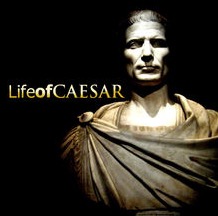
Life of Caesar
Unscripted, Cameron Reilly and Ray Harris Jr.,
1hr-3hr, Weekly
Yes, a podcast dedicated to telling the biography of Augustus Caesar. The two bro’ hosts chit-chat their way through Caesar’s story.
47.
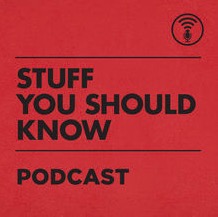
Stuff You Should Know
Unscripted, Josh Clark and Charles W. “Chuck” Bryant,
20-60 min, Twice-weekly
The folks from How Things Work do an audio version. Two hosts discuss esoteric topics like “How wine fraud works” or “How lobbying works” “How female puberty works,” etc.
48.
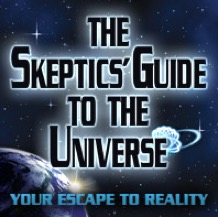
The Skeptics’ Guide to the Universe
Unscripted, Dr. Steven Novella,
80 min, Weekly
Four or so skeptics sit around and discuss the week’s news from a skeptic (rational and scientific) perspective.
49.

On the Media
Scripted, Brooke Gladstone and Bob Garfield,
60 min, Weekly
Very polished newscast (recycled from public radio) about media matters. It’s meta-media.
50.

Criminal
Scripted, Phoebe Judge,
20 min, About 2 per month
As their website says “Stories of people who’ve done wrong, been wronged, or gotten caught somewhere in the middle.” Broad, not just true crime, but also about the justice system, the prison system, or legal gray areas.
Image: Tim Wilson from Blaine, MN, USA, licensed under the Creative Commons Attribution 2.0 Generic license.
10/20/15





